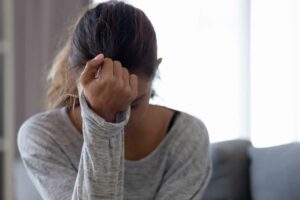Do you feel like you’re constantly stuck in a never-ending cycle of intrusive thoughts, compulsive behaviors, and extreme anxiety? If so, you may be experiencing OCD episodes. OCD (obsessive-compulsive disorder) is a mental illness that can cause a great deal of distress and anguish. In this blog post, we will discuss what OCD episodes are, the symptoms associated with them, and how to deal with them effectively.
Contents
What Are OCD Episodes?
 OCD episodes are basically when your OCD thoughts or behaviors become more intense or frequent. OCD episodes are simply defined as a period when your OCD symptoms are more severe.
OCD episodes are basically when your OCD thoughts or behaviors become more intense or frequent. OCD episodes are simply defined as a period when your OCD symptoms are more severe.
Many people with OCD will have episodes where their symptoms are relatively mild, and other times when their symptoms are more severe. It’s important to remember that everyone experiences OCD differently, so what may be considered an episode for one person may not be for another.
Let’s understand with an example,
An individual with contamination OCD may have an episode triggered by coming in contact with a doorknob. This may cause them to wash their hands excessively or avoid touching anything else. In this case, the person would likely be considered to be in an OCD episode if they are spending more than an hour washing their hands or if they are avoiding all contact with surfaces.
Another example could be someone with Pure-O OCD who has intrusive thoughts about harming others. They may have an episode where they are obsessively thinking about harming people and cannot get these thoughts out of their heads. In this case, the person would likely be considered to be in an OCD episode if they are having these thoughts for more than an hour each day.
What Triggers OCD Episodes?
There are a few different things that can trigger an OCD episode. Some common triggers include:
Stress
This is probably the most common trigger for an OCD episode. Stress can come from work, school, family, or any number of other things. When you’re stressed, your body goes into “fight or flight” mode and this can make your OCD thoughts and behaviors worse.
Stress causes anxiety and depression to worsen. It is very important to manage stress to keep your OCD under control. Because it is believed that stress is a major trigger for OCD episodes, it is important to find healthy ways to cope with stress.
Traumatic Event
Trauma is a big trigger for OCD episodes. If you’ve been through a traumatic event, it can make your OCD worse. According to the APA, trauma is an emotional response to a terrible event. In OCD episodes, trauma can trigger intrusive thoughts, which can then lead to compulsions and rituals.
Moreover, this can also trigger avoidance behaviors. You may start avoiding people, places, or things that remind you of the trauma. This can make your OCD even worse and make it harder to get help.
Lifestyle Changes
 When you’re already dealing with OCD, even small changes can trigger an episode. Because OCD episodes are likely to happen when your routine changes. So, if you’re going on vacation or starting a new job, that can be a trigger.
When you’re already dealing with OCD, even small changes can trigger an episode. Because OCD episodes are likely to happen when your routine changes. So, if you’re going on vacation or starting a new job, that can be a trigger.
Even positive changes, like getting married or having a baby, can trigger an OCD episode. This is because your life is suddenly very different and you may feel out of control. These life changes can add more stress to your life and make it harder to stick to your treatment plan.
Hormonal Changes
This is considered a less common trigger, but it is possible. If you’re a woman, your hormones can play a role in triggering OCD episodes. For example, pregnancy and menopause can both trigger OCD episodes.
This is because changes in hormone levels can cause changes in your mood and anxiety levels. And, to increase the chances of a successful pregnancy, it’s important to manage your OCD.
Changes in Medication
If you’re taking medication for your OCD, changes in your dosage or medication can trigger an episode. This is because the changes in your medication can cause changes in your mood and anxiety levels. So, if you’re starting a new medication or changing your dosage, be sure to talk to your doctor about the risks.
As you can see, there are a few different things that can trigger an OCD episode. If you know what triggers your episodes, it can be helpful to avoid those triggers or be prepared for them. However, it’s important to remember that even if you do everything right, an OCD episode can still happen. So, don’t be too hard on yourself if it does.
What Are The Symptoms Of OCD Episodes?
There are high chances that the symptoms of episodes can also go severe with the person. However, the most common symptoms that are usually reported by people during OCD episodes are:
- Excessive hand washing.
- Repeatedly checking things.
- Arranging and ordering things in a particular way.
- Hoarding things.
- Skin picking.
- Hair pulling.
These are some of the most common symptoms that people usually experience during OCD episodes. However, it is important to remember that the symptoms can vary from person to person. And these symptoms can also be different in intensity and severity.
In addition, the symptoms of these episodes can also vary depending on the type of OCD that a person has. For example, people with contamination OCD might experience different symptoms than people with symmetry OCD. So, talk to your doctor about your symptoms and get the help that you need.
How To Deal With OCD Episodes?
 This is a question that many people who suffer from OCD ask themselves daily. While there is no one definitive answer, understanding your triggers and how to deal with them can help manage your disorder. Moreover, there are a few tips that can help you get through an OCD episode.
This is a question that many people who suffer from OCD ask themselves daily. While there is no one definitive answer, understanding your triggers and how to deal with them can help manage your disorder. Moreover, there are a few tips that can help you get through an OCD episode.
Identify The Triggers
As the triggers can be different for everyone, it is important to take some time and figure out what sets off your OCD episodes. Once you know what these triggers are, you can be more aware of them and try to avoid them. If avoiding the trigger is not possible, then try to expose yourself to the trigger in a controlled manner. This will help you desensitize yourself to the trigger and eventually make it less effective.
Talk To Someone Who Understands
If you feel like you are struggling to deal with your OCD episodes on your own, talk to someone who understands. This could be a friend or family member who suffers from OCD themselves or a mental health professional. Talking about your experiences can help you feel less alone and more in control. Also, this is the safest place to vent about your triggers and any negative thoughts or feelings you are having.
Seek Professional Help
If you feel like your OCD is starting to take over your life, seek professional help. This is the most effective way to get long-term help and treatment. A mental health professional will be able to assess your situation and create a treatment plan that is tailored specifically for you.
Also, find a therapist who is specialized in treating OCD. You can try free consultation with the Mantra Care team of therapists to get started. The team will find the right and perfect match as per your condition. Moreover, the best thing is, that Mantra Care works online so you can get help from anywhere in the world in your comfort zone.
Join A Support Group
Support groups are a great way to meet other people who understand what you are going through. In a support group, you can share your experiences and learn from the experiences of others. This can be an invaluable resource when dealing with OCD episodes. There are many online and offline support groups that you can join. If you cannot find a support group in your area, there are also online groups that you can join. And in this case, too, Mantra Care can be a great help as they have an online support group for people suffering from OCD.
Be Patient With Yourself
 Recovery from OCD takes time and it is important to be patient with yourself. There will be good days and bad days but eventually, the bad days will start to become fewer and further between. Treatment can be challenging but it is important to remember that recovery is possible. As there is one quote that says, “The only way out is through.” So be patient and keep going, even when it feels impossible.
Recovery from OCD takes time and it is important to be patient with yourself. There will be good days and bad days but eventually, the bad days will start to become fewer and further between. Treatment can be challenging but it is important to remember that recovery is possible. As there is one quote that says, “The only way out is through.” So be patient and keep going, even when it feels impossible.
These are a few tips that can help you deal with OCD episodes. If you are struggling with your OCD, please seek professional help. Remember, you are not alone and there is help available. Mantra Care offers free consultations so that you can find the right therapist for you. You can also join their online support group to connect with other people who understand what you are going through.
Conclusion
To conclude, OCD episodes can be very difficult to deal with, but some things can help. If you or someone you know is struggling with OCD, don’t hesitate to reach out for help. There are many resources available and treatment can be very effective. Remember, you are not alone.
This is one of the most important things to remember. OCD can be very isolating, but there is a large community of people who understand what you’re going through and can offer support. Seek out online forums or in-person support groups. These can be invaluable resources and provide a sense of connection and belonging.
If you are looking for affordable Online OCD Counseling MantraCare can help: Book a trial OCD therapy session


